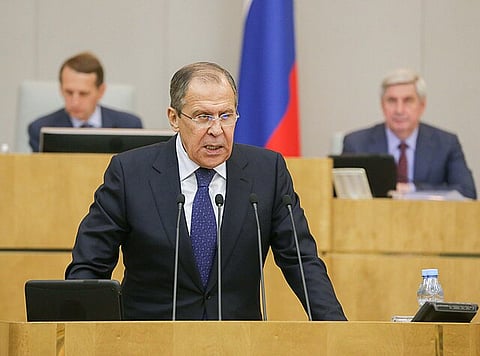

Russian Foreign Minister Sergei Lavrov addressed the United Nations General Assembly on Saturday, stating that Russia has no intention of attacking European or NATO countries but warning that any aggression against Moscow would be met with a "decisive response" . His speech came amid a significant spike in tensions across Europe, with NATO reporting multiple unauthorized incursions into its airspace by Russian aircraft and drones in recent weeks . Lavrov framed these incidents, which include jets over Estonia and drones over Poland, as either accidental or misrepresented, with Belarus suggesting Ukrainian signal-jamming deflected the drones . He characterized the rhetoric from NATO capitals, particularly from Germany, as "militaristic" and warned against attempts to test Russia's resolve, especially regarding its territorial integrity .
The repeated airspace violations have exposed clear divisions within NATO on how to formulate a response . While the alliance issued a statement vowing to use "all necessary military and non-military tools" to defend itself, members are split on the specifics . Countries on NATO's eastern flank, such as Poland and Estonia, have advocated for a policy that would see future violations met with force, including shooting down manned aircraft . This position has been echoed by U.S. President Donald Trump, who stated he endorses the idea of downing Russian jets that violate NATO airspace . However, other nations, including Germany, urge restraint, with German officials cautioning against falling into an "escalation trap" and emphasizing that "prudence is not cowardice" . This lack of a unified, robust response is seen by some analysts as precisely the reaction Moscow may have been testing for .
Striking a notably open tone, Lavrov expressed Moscow's hope for continued "frank dialogue" with the United States under the Trump administration . He noted the recent summit between President Vladimir Putin and Donald Trump in Alaska and stated that Russia sees in the current U.S. approach a "desire to develop pragmatic cooperation" . This contrasted with his criticism of other Western leaders. Lavrov's comments came just after President Trump voiced a strengthened commitment to Ukraine, asserting his belief that it could win back all territory lost to Russia . This shift followed a closed-door meeting with Ukrainian President Volodymyr Zelenskyy, who warned the UN that inaction against Russia would put other countries at risk, declaring "Ukraine is only the first" .
Expanding his address beyond Europe, Lavrov also presented Russia's position on the Middle East, where it positions itself as a critic of Israeli policy . He accused Israel of actions that "threaten to blow up the entire Middle East" and strongly condemned any potential move to annex the occupied West Bank, which he described as a "coup d'etat" aimed at burying the prospect of a Palestinian state . He mocked the recent wave of recognitions of Palestinian statehood by Western nations like France and Britain, asking, "What took them so long?" . This stance aligns Russia with the majority view at the UN and against Israeli Prime Minister Benjamin Netanyahu, who, in his own combative UN speech, rejected a Palestinian state as "national suicide" for Israel .